More on this book
Community
Kindle Notes & Highlights
Read between
April 1 - April 21, 2023
During the months of killing in 1994, as I followed the news from Rwanda, and later, when I read that the United Nations had decided, for the first time in its history, that it needed to use the word “genocide” to describe what had happened, I was repeatedly reminded of the moment, near the end of Conrad’s Heart of Darkness, when the narrator Marlow is back in Europe, and his aunt, finding him depleted, fusses over his health. “It was not my strength that needed nursing,” Marlow says, “it was my imagination that wanted soothing.”
Fifteen months earlier, Rwanda had been the most densely populated country in Africa.
It was dated April 15, 1994. Our dear leader, Pastor Elizaphan Ntakirutimana, How are you! We wish you to be strong in all these problems we are facing. We wish to inform you that we have heard that tomorrow we will be killed with our families. We therefore request you to intervene on our behalf and talk with the Mayor. We believe that, with the help of God who entrusted you the leadership of this flock, which is going to be destroyed, your intervention will be highly appreciated, the same way as the Jews were saved by Esther. We give honor to you.
By the time that the League of Nations turned Rwanda over to Belgium as a spoil of World War I, the terms Hutu and Tutsi had become clearly defined as opposing “ethnic” identities, and the Belgians made this polarization the cornerstone of their colonial policy.
Then, in 1933–34, the Belgians conducted a census in order to issue “ethnic” identity cards, which labeled every Rwandan as either Hutu (eighty-five percent) or Tutsi (fourteen percent) or Twa (one percent). The identity cards made it virtually impossible for Hutus to become Tutsis, and permitted the Belgians to perfect the administration of an apartheid system rooted in the myth of Tutsi superiority.
Paul believed in free will. He understood his actions during the genocide in the same way that he understood those of others, as choices. He didn’t seem to think that he could be called righteous, except when measured against the criminality of others, and he rejected that scale. Paul had devoted all his diverse energies to avoiding death—his own and others’—but what he feared even more than a violent end was living or dying as what he called a “fool.” Regarded in this light, the option of kill or be killed translated into the questions: kill for what? be killed as a what?—and posed no great
...more
The genocide had been tolerated by the so-called international community, but I was told that the UN regarded the corpse-eating dogs as a health problem.
“I hear you’re interested in genocide,” the American said. “Do you know what genocide is?” I asked him to tell me. “A cheese sandwich,” he said. “Write it down. Genocide is a cheese sandwich.” I asked him how he figured that. “What does anyone care about a cheese sandwich?” he said. “Genocide, genocide, genocide. Cheese sandwich, cheese sandwich, cheese sandwich. Who gives a shit? Crimes against humanity. Where’s humanity? Who’s humanity? You? Me? Did you see a crime committed against you? Hey, just a million Rwandans. Did you ever hear about the Genocide Convention?” I said I had. “That
...more
Even if not taking sides were a desirable position, it is impossible to act in or on a political situation without having a political effect.


